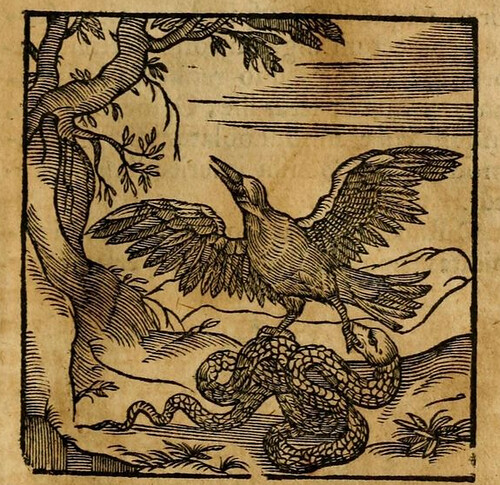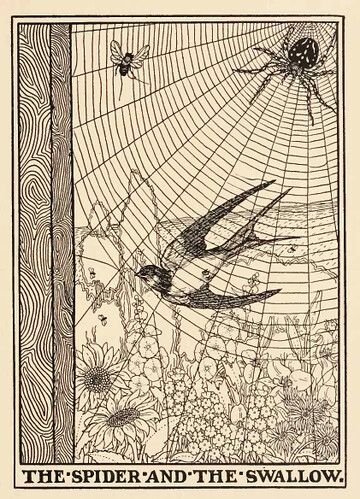This is another of those "special editions" at the
Bestiaria - but don't worry: the regular "Round-Up" will return tomorrow, I promise. :-)
Thanks to a video that
Howard Rheingold published last week -
Why the History of the Public Sphere Matters in the Internet Age (
YouTube, 13 minutes; see below) - I've decided to collect some notes here about Sir Roger L'Estrange. In that video (well worth listening to!), Rheingold urges us to study the history of public discourse, especially in 17th-century England, in order to learn what printing, the revolutionary technology of that era, can teach us about the Internet, democracy, and the public sphere in our own day.
Career of Roger L'Estrange. I was intrigued by Rheingold's remarks because one of the central figures in public discourse in 17th-century England was Sir Roger L'Estrange, someone well known to me because he is the author of what is still the single greatest compilation of Aesop's fables in English, a mighty volume entitled
Fables of Aesop and Other Eminent Mythologists, which L'Estrange published in 1692. Most people today, however, do not know L'Estrange as the author of this book of fables. Instead, they know him as a notorious spy for the Royalists in the English Civil War (he was sentenced to death for his role in the Lynn conspiracy of 1644, although he escaped from Newgate Prison and fled to Holland). Later, after the Restoration of the monarchy in 1660, L'Estrange became known as the "Bloodhound of the Press," suppressing sedition and dissent in his appointments both as Surveyor of the Imprimery and also as Licenser of the Press. He was knighted by King James II in 1685, largely in recognition of his role in exposing the so-called Popish Plot (see the books below:
The History of the Plot and
A Further Discovery of the Plot). As a member of the Tory faction that favored James II's succession, L'Estrange was elected to Parliament in that same year. Yet even though he was a staunch Tory, L'Estrange's rabid anti-Catholicism led him to fall out of royal favor rather quickly, whereupon he retired from public life and devoted himself to writing. It is during this time that he penned his massive collection of Aesop's fables, among many other works, and I have listed below the books by L'Estrange which are now freely available via Google Books and the Internet Archive. Whatever you might think of his politics, L'Estrange ranks as one of the most lively masters of prose in 17th-century England, and his hyperbolic, racy style is quite astounding. I wish our political discourse today were as witty and well written!
L'Estrange and Aesop. L'Estrange's interest in Aesop's fables might seem surprising, given that nowadays we associate Aesop's fables with children's literature, but that was certainly
not the case for the way Aesop's fables had been used for the two thousand years preceding L'Estrange's own edition of Aesop in 1692. Since their very beginning in the oral traditions of ancient Greece, Aesop's fables were stories told for political purposes. As such, the fables were a contested space, being appropriated by a whole range of speakers, including both slaves and their masters in ancient times. The oldest surviving collection of Aesop's fables, for example, is a collection of verse fables composed by Phaedrus, a freed slave in the household of the Emperor Augustus. Aesop himself, according to the legendary
Life of Aesop, started out life as a slave - and quite an "uppity" slave at that. Yet while many of the fables advocate personal freedom and popular liberty, there are also numerous fables that defend the institution of slavery, conservatively insisting on an anti-egalitarian
status quo. So too in L'Estrange's day, when both democrats and monarchists wielded the fables in defense of their claims.
The Politics of the Fables. When L'Estrange decided to compose his own book of fables in English, he resolved that his collection would be more complete and comprehensive than any assembled in English before, containing all the fables known from ancient Greece and Rome, as well as the contributions of Renaissance fabulists such as the brilliant Abstemius, whose anti-ecclesiastical fables no doubt delighted L'Estrange. Yet this comprehensive approach to the fables presented L'Estrange with a serious dilemma: what was he going to do about all those populist and anti-royalist fables? In particular, Aesop's lion-king is often a brutal tyrant, someone not just to be feared, but resisted and even deposed. The famous fable of the "lion's share," to take just one example, is a sharp attack on the greed of kings (see my brief essay linked below:
The Lion’s Share in Roger L’Estrange). Yet L'Estrange was not deterred by these potential problems. Rather than omitting the rebellious fables, he massaged their dangerous implications by adding copious "Reflections" to each fable, a kind of secular sermon in which he always managed to bring things around to his point of view, sometimes writing page after page of commentary on a fable that was itself only a few sentences in length.
Digital Resources. This then brings me to the main point I would like to make in these remarks, a kind of corollary to Howard Rheingold's comments on the study of history and the public sphere today. Rather than providing a list of further examples of L'Estrange's twisting of the fables for his own purposes, I can invite you to take a look for yourself! Thanks to the open resources of Google Books and the Internet Archive, you can read any and all of L'Estrange's fables for yourself, along with many other works printed during his lifetime and reprinted after his death. Take a look below for the astounding numbers of books and pamphlets by Sir Roger L'Estrange available via Google Books and the Internet Archive. For me, as a sometime scholar and voracious reader, the digitization of books in the public domain is a crucial element in the ongoing Internet Revolution, and it is a project that we need to defend vigorously (e.g.
express your support of the Hathi Trust!).
DIY Scholarship. So, if you want to heed Howard Rheingold's advice to learn something about history, you can indeed do that for yourselves, accessing primary sources freely online. Admittedly, this is only a partial picture: L'Estrange, after all, was one of the people who dominated the English press in the 17th century, using it for his own purposes while viciously suppressing the efforts of dissenters to use the press for their counter-purposes. Yet this is the challenge that we always face in historical investigations: the documentary picture is partial at best, and it is up to us to use our discerning powers and critical acumen to imagine a bigger picture, based on the evidence available. Thanks to Google Books and the Internet Archive, we have a lot of evidence to work with, and no longer are these books locked away in university libraries where only a few privileged scholars could gain access to them. As always, I say THANK YOU to the people making Google Books and the Internet Archive possible. These projects have completely changed my own life as a scholar and I encourage you to browse these treasure-troves on your own, just to see what you can find of interest!
L'Estrange at Google Books and the Internet ArchiveAn Alphabetical Key to Hudibras (in The Posthumous Works of Mr. Samuel Butler), by Sir Roger L'Estrange (1754).
An Answer to the Appeal from the Country to the City, by Sir Roger L'Estrange (1679).
The Cast Put Concerning the Succession of His Royal Highness, The Duke of York, by Sir Roger L'Estrange (1679).
Citt and Bumpkin in a Dialogue Over a Pot of Ale, Concerning Matters of Religion and Government, by Sir Roger L'Estrange (1680).
The Dissenters Sayings Publishing in Their own Words, by Sir Roger L'Estrange (1705).
Fables of Aesop and Other Eminent Mythologists, translated by Sir Roger L'Estrange (1738; the Fables were first published in 1692 as two separate volumes -
Volume 1 and
Volume 2. Rather oddly, L'Estrange's fables provide the text for the Everyman's Children's Library edition of Aesop, as if children are ready to read L'Estrange's 17th-century prose! Be warned also that this modern edition stops at the corpus of classical fables and does not include the hundreds of other fables that L'Estrange selected from Abstemius, Poggio Bracciolini and other later Latin writers. Still, the Everyman book is good fun - it's actually how I first became acquainted with L'Etrange, stumbling across the book quite by accident many years ago. Find out more at
Amazon.com.)
A Further Discovery of the Plot, Drawn from the Narrative and Depositions of Dr. Titus Oates, by Sir Roger L'Estrange (1678).
The History of the Plot [of Edward Coleman and others], by Sir Roger L'Estrange (1679).
A Memento Treating of the Rise, Progress, and Remedies of Seditions, by Sir Roger L'Estrange (1682).
News from New-England, being a True and last Account of the present Bloody Wars carried on betwixt the Infidels, Natives and the English Christians, by Sir Roger L'Estrange (1850).
A Seasonable Memorial in some Historical Notes upon the Liberties of the Presse and Pulpit, by Sir Roger L'Estrange (1681).
Select Colloquies out of Erasmus Roterodamus, translated by Sir Roger L'Estrange (
1689).
Seneca's Morals, translated by Sir Roger L'Estrange (1718).
The State and Interest of the Nation, by Sir Roger L'Estrange (1680).
Toleration Discuss'd in Two Dialogues, by Sir Roger L'Estrange (1670).
Tully's Offices, translated by Sir Roger L'Estrange (1720).
Two Cases Submitted to Consideration, by Sir Roger L'Estrange (1709).
Tyranny and Popery, by Sir Roger L'Estrange (1680).
The Visions of Dom Francisco de Quevedo, translated by Sir Roger L'Estrange (1696).
Other Online ResourcesThe Lion’s Share in Roger L’Estrange by Laura Gibbs, in
Journey to the Sea (August 15 2009)
Strange's Case, Strangly Altered, a broadside satire of 1680 (at the
British Museum)
Below is John Michael Wright's
portrait of Sir Roger L'Estrange, now in the National Portrait Gallery in London:



![[wolf_reading.gif]](https://blogger.googleusercontent.com/img/b/R29vZ2xl/AVvXsEilwW3W9ddB6bKaeRuU7GCIASXoAj97WZiwiAifCZrwg_IJyLYhyLFqrNySAlVIYWfb24abf0tMeGu-11_7DXDf9T6ugjnnzhXm05fdA9Lh6neWbJ2qpehrPj61ABTKNNM2-1JBP5gKfrg/s1600/wolf_reading.gif)










